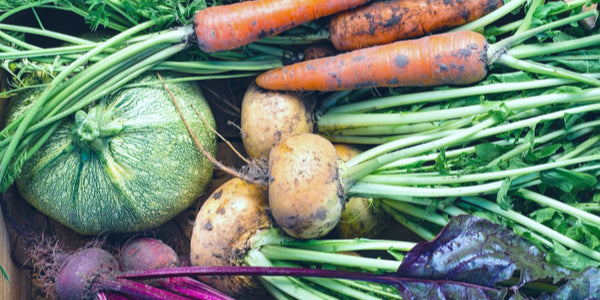
Root vegetables are good to the core, and delicious top to bottom. These nearly magical vegetables seem like an underground secret that is just being brought to light.
However, root veggies have been utilized for centuries as medicine with healing properties. They help to provide important vitamins and minerals necessary for thriving each day.
Being fueled by powerful nutrients, root veggies can take center stage in any diet plan. Read on for a root vegetable list and to learn more about the health benefits of root vegetables.
What Are Root Vegetables?
In short, root vegetables are namely veggies that grow underground. They are the root or growths around the base of a plant and are unique in many ways.
Like any plant, plants need their roots to survive. Water and nutrients from the soil are absorbed into the roots. This makes the roots or base components of root vegetables nutritious and full of vitamins and minerals ready for human consumption.
Reasons to Eat More Root Vegetables
Root vegetables are packed with vitamins and minerals, making them extremely nutrient-dense. They are also nature's version of shelf-stable food, meaning they stay fresh longer than other varieties of vegetables (up to weeks or months). This makes them both healthy and healthier for the budget.
Most root veggies are found fresh and local for at least six months of the year, so they are likely in season. Plus, buying local means benefitting from the rich minerals of the soil in that area while helping support local agriculture.
Root veggies are also heart-healthy due to being naturally low in minerals like sodium while providing high concentrations of potassium and fiber in each bite. Fiber helps to keep the gut healthy and the bowel moving. This set of nutrients also can improve blood pressure and blood sugar levels.
List of Root Veggies
Coming in many colors, shapes, and sizes, root vegetables are a fun way to add variety to any dish.
Bulbs:
• Fennel
• Onions
• Garlic
Corms:
• Celery root
• Water chestnut
Rhizomes:
• Ginger
• Turmeric
Taproots:
• Turnips
• Carrots
• Parsnips
Tuberous roots:
• Sweet potatoes
• Yucca
Tubers:
• Jerusalem artichokes
• Potatoes
• Yams
Uses & Benefits of Root Vegetables
Since root vegetables, by nature, are grown at the root or base of the plant, these veggies often contain vital nutrients stored for the use of nourishing the rest of the plant in colder months.
Over the years, root vegetables have grown in popularity as plant-based cooking has become a focal point of cuisine. They can be prepared in many ways, including roasted root veggies or baking into casseroles.
While these vegetables are relatively low in calories and high in antioxidants, it is important to remember that they are still very starchy carbohydrates and should be eaten judiciously as part of a balanced diet.
Uses
As fresh whole foods, root vegetables are very versatile veggies that can add variety to any diet. Harvard dietitian Teresa Fung recommends eating one serving of root vegetables a day since these vegetables contain many vitamins and minerals. It functions well as a side dish or as the starch component of the main plate.
Also, vary root vegetables in the diet rotation. Eating a wider variety of veggies means a wider variety of nutrients available for absorption.
Easy ways to eat root vegetables:
• Boiled
• Mashed
• Baked
• Roasted like these carrots
• Tossed into soup
• Added to casseroles and stir-fries
• Raw
Health Benefits
Root vegetables function as a storage unit for water and nutrients in the plant, and that variety of vitamins and minerals becomes a powerful nutrient source for human consumption.
• Natural coloring: Including root veggies is an easy way to add color to the plate and many come in unique varieties. These include black carrots or beetroots, which are already used widely as coloring agents in the food and drug industry. This has been a great natural alternative for those allergic to synthetic colors and artificial dyes.
• Anti-inflammatory: One study reported that purple carrots and potatoes produce a potential anti-inflammatory effect that may prove to be a beneficial model for alleviating inflammatory disease in the future.
• Gut health: Another study found that "good" bacteria coming from root vegetables was able to break down gluten and help to mediate gluten intolerance in the gastrointestinal tract.
• Overall health: Purple varieties of carrots and potatoes, specifically, have been studied as unique and ideal sources of antioxidants that can help to alleviate injury and illness in the body, including restoring intestinal inflammatory balance and ultimately improved overall health.
The Bottom Line
Root vegetables are an excellent addition to the human diet, supplying colorful variety and providing unique profiles of health-promoting compounds. They offer a diverse array of colors, chemicals, compositions, and effects for those who consume them. They add flavor and fun to any dish, even desserts such as sweet potato pie or drinks such as turmeric milk or ginger tea.
They go beyond their early underground roots to offer alternative coloring solutions in the food and drug industry and also play an important role in a balanced diet by adding nutrients that nourish the human body at the core.
References:
Harvard Health Letter. The pros and cons of root vegetables. Harvard Health Publishing. https://www.health.harvard.edu/staying-healthy/the-pros-and-cons-of-root-vegetables.
Kõiv V, Adamberg K, Adamberg S, Sumeri I, Kasvandik S, Kisand V, Maiväli Ü, Tenson T. Microbiome of root vegetables-a source of gluten-degrading bacteria. Appl Microbiol Biotechnol. 2020 Oct;104(20):8871-8885. doi: 10.1007/s00253-020-10852-0. Epub 2020 Sep 2. PMID: 32875365; PMCID: PMC7502452.
Ligos L. 5 Reasons to Eat More Root Vegetables. The Sassy Dietitian. 2015. https://thesassydietitian.com/5-reasons-to-eat-more-root-vegetables/.
Petropoulos SA, Sampaio SL, Di Gioia F, Tzortzakis N, Rouphael Y, Kyriacou MC, Ferreira I. Grown to be Blue—Antioxidant Properties and Health Effects of Colored Vegetables. Part I: Root Vegetables. Antioxidants. 2019; 8(12):617.
Zhang H, Liu R, Tsao R. Anthocyanin-rich phenolic extracts of purple root vegetables inhibit pro-inflammatory cytokines induced by H2O2 and enhance antioxidant enzyme activities in Caco-2 cells. Journal of Functional Foods. 2016;22:363-375.







